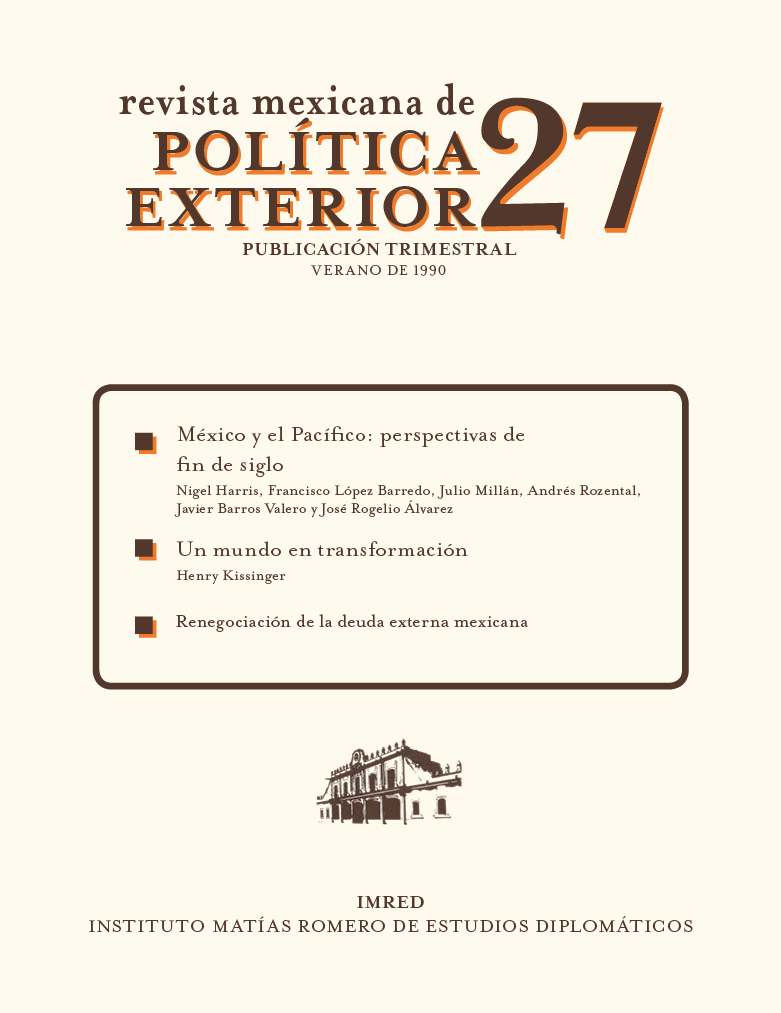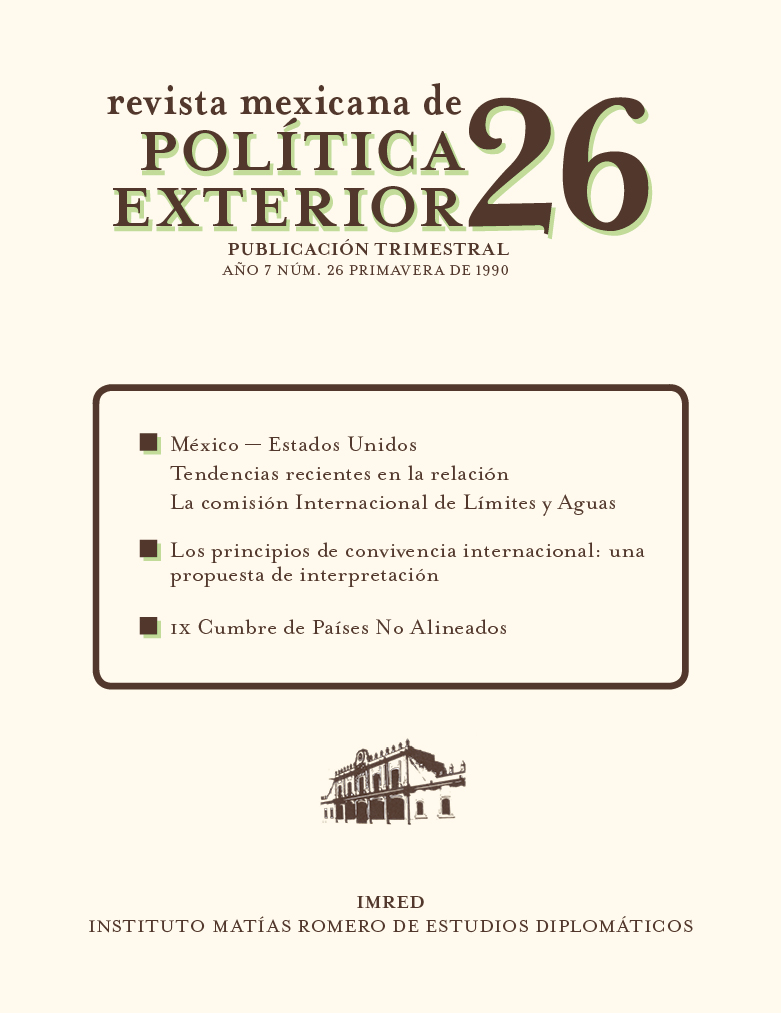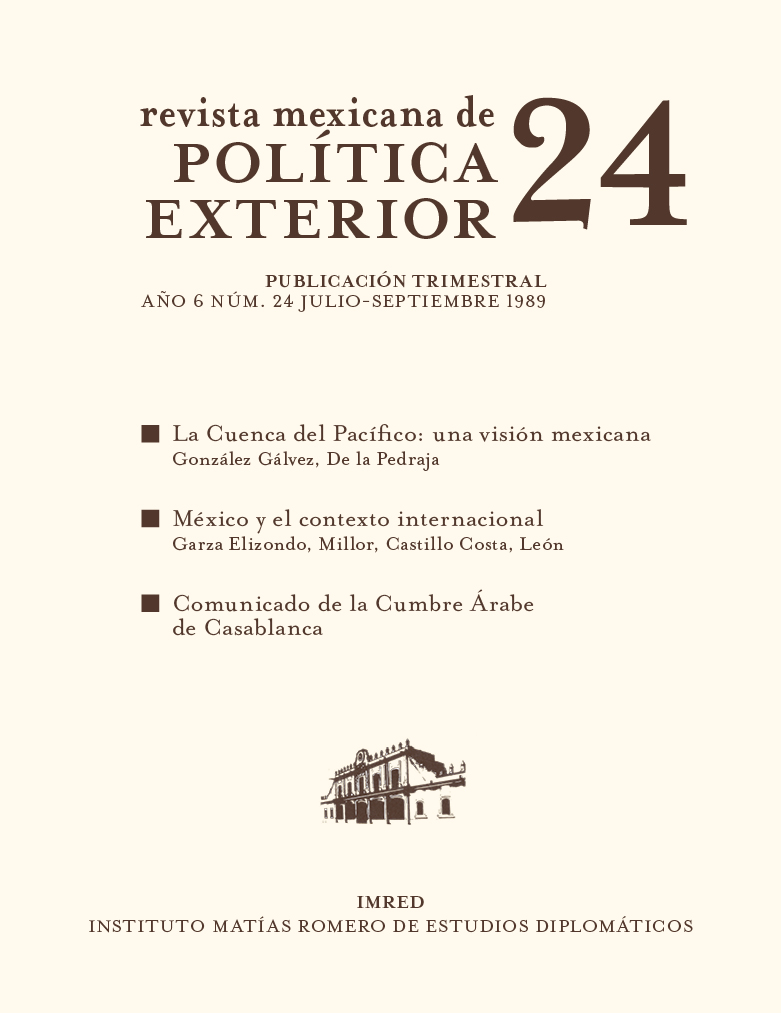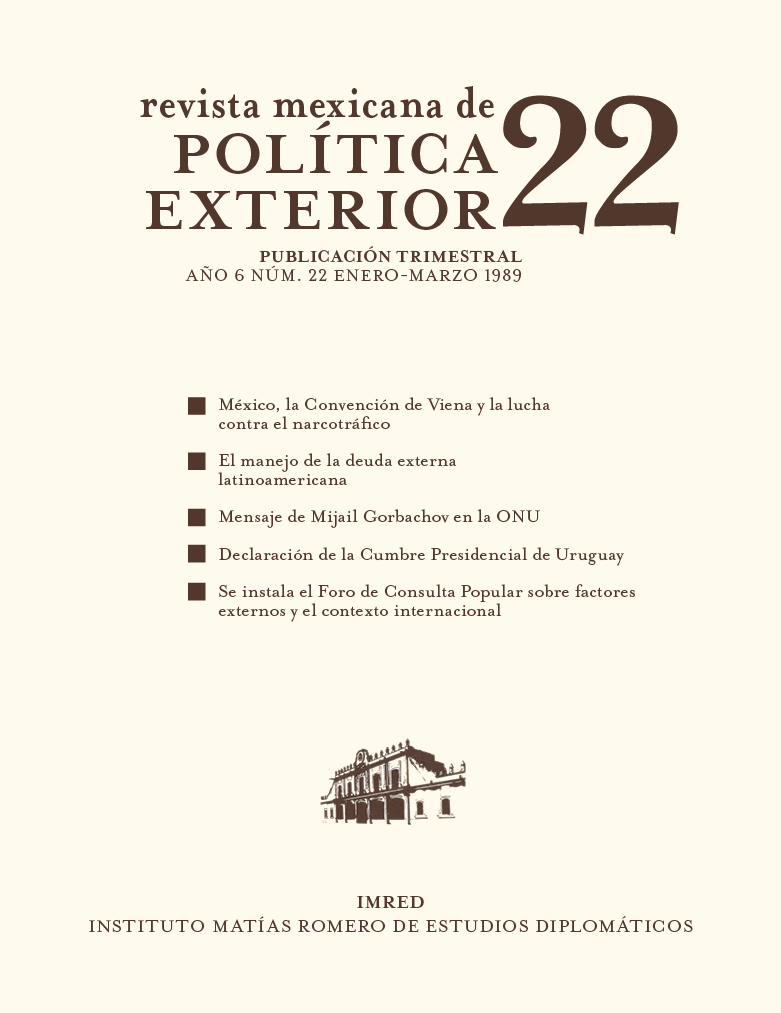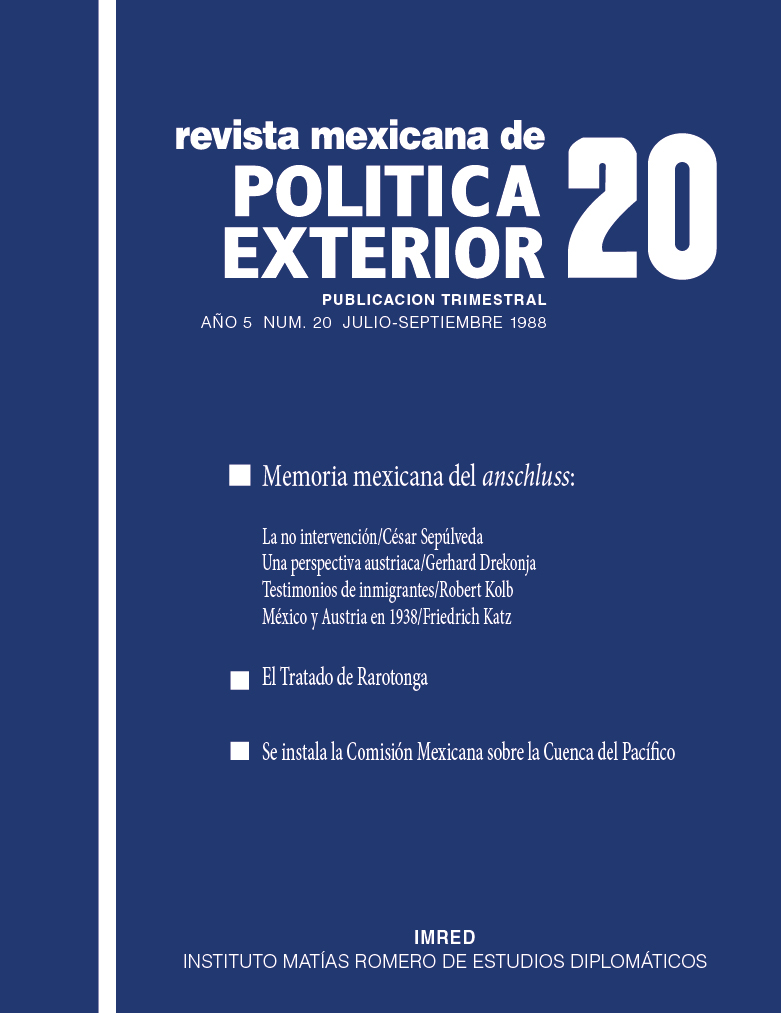Latin America and the International Scene. Contadora and the Group of Eight. Mexico and Disarmament. Refugees in Africa
No. 31 (1991)
The Revista Mexicana de Política Exterior has dedicated its Essays section to topics related to the political, economic, and diplomatic problems of Latin America, as well as to disarmament processes.
Four Topics on the US-Mexico Agenda. Argentine-Brazilian Economic Integration. Presidential Tour of Latin America
No. 30 (1991)
Among the fascinating spectrum of new international developments, one stands out that, due to its magnitude, will surely have great repercussions on the daily lives of millions of human beings: the formation of commercial blocs and the processes of economic integration. The beginning of the negotiations around the free trade agreement with Canada and the United States; the agreements with Venezuela, Colombia, Chile and the rapprochement with South America, the liberalization of trade with Central America and the opening of the country to Europe and the Pacific are processes that require great analytical, conceptual and debate efforts regarding their scope and limits, as well as the consequences of different signs that these commercial initiatives will have on Mexican society, politics and economy. The Revista Mexicana de Política Exterior wishes to contribute to this effort with the topics addressed in this edition, all of them linked to the country's international political and economic relations; Emphasis is placed on reviewing four issues on the Mexico-United States bilateral agenda: the free trade agreement, the fight against drug trafficking, the protection of migrant workers, and the evolution of Mexican-American relations in the 1980s.
Mexico and Latin America in the nineties. Initiative for the Americas. New presence of Mexico in Africa
No. 29 (1990)
The long and sometimes exasperating process of forming a political will that acts in the direction of greater Latin American integration now seems to find a propitious moment because powerful stimuli are coming into synchrony: the consolidation of blocs and that there are conditions that reverse or modify some of the causes that have undermined the realization, among them, the weight of unfavorable influence of the hegemonic powers, the tenacious existence of dictatorial regimes, the scarce complementarity and open competition between the markets of the area, the deficiencies in the communication channels and systems , and the lack of a "culture of integration". This edition of the Revista Mexicana de Política Exterior wants to contribute to the necessary debate on the future of these processes, in the context of Latin American relations with the United States, under the understanding that a good part of the paths that the integrationist idea takes will depend on the effort intellectual in the search for better unitary alternatives.
Europe: change and continuity. The Mexican islands and their international projection. Mexico-Finland relations. The Group of Three and cooperation with Central America
No. 28 (1990)
The 28th issue of the Journal presents fresh and interesting materials for those who wish to delve into the modalities and the environment in which Mexican foreign policy moves. Varied in its themes, the magazine shows the diversity of interests in Mexico: the fight against drug trafficking; the economic importance, the legal regime and the international projections of the Mexican islands; the Persian Gulf crisis; the perspectives of the relations between Mexico and Finland; strengthening relations with Australia and Japan; European processes; Latin American integration; the conflict in Central America; the diversification of international economic relations, and the strengthening of South-South relations.
Mexico and the Pacific: Prospects for the End of the Century. A World in Transformation. Renegotiation of the Mexican Foreign Debt
No. 27 (1990)
Sustained in the spirit of respectful and civilized coexistence with the rest of the nations of the world, the pages of the Revista Mexicana de Política Exterior collect documents and analyzes regarding Mexico's relations with the world; in this issue the central theme is the Pacific Rim. In order to round out the content and purposes of the magazine, various pronouncements are presented that directly attest to the international activity of the government of the Republic.
Mexico-United States: Recent Trends in the Relationship and the International Boundary and Water Commission. The Principles of International Coexistence: A Proposal for Interpretation. Ninth Summit of the Non-Aligned Countries
No. 26 (1990)
The times call for a proactive attitude, so that the temporary breakdown of principles is not at odds with creativity, and stupor does not cloud perspectives. In the field of foreign policy, these attitudes are not only necessary, but indispensable. It is in such an environment that international law has developed. From this perspective, this publication —which with this issue enters its seventh year of continuous appearance— explores the vast conceptual and operational universe of Mexico's past and present international action.
Mexico-United States: Recent Trends in the Relationship and the International Boundary and Water Commission
The Principles of International Coexistence: A Proposal for Interpretation
Ninth Summit of the Non-Aligned Countries
New Approaches to the Pacific Rim. Declaration of Tela
No. 25 (1989)
The management of foreign affairs acquires a leading role for the future of Mexico. For this reason, the political spaces conquered abroad must be reinforced and complemented with the generation and expansion of international links of a commercial, technological and cultural nature. It is these considerations and concerns that occupy the attention of the essays that make up this issue of the Revista Mexicana de Política Exterior. In them various comments are issued on the theoretical premises, past and recent performance and the projection of foreign policy in certain areas, such as the Pacific Rim, Mexico's relations with the countries of the socialist bloc, Mexico-Egypt relations, the guidelines of liberal thought in the configuration of Mexican foreign policy and the search for peace in Central America.
The Pacific Rim: A Mexican Perspective. Mexico and the international context. Communiqué of Extraordinary Arab Summit Conference
No. 24 (1989)
Knowing with precision and depth the framework of the present decade to evaluate the possibilities and margins of action, is a fundamental imperative for countries that, like Mexico, are struggling to achieve a favorable insertion in that reality in the face of the 21st century. Such is the concern expressed in the articles in this issue of the Revista Mexicana de Política Exterior. This edition includes essays on the Pacific Rim, a very important topic for Mexico's foreign policy; the nature of the new détente in East-West relations; the homogenization of world society, political democratization, multipolarity and geopolitical displacement, and the current crisis of the world economy and the possible great depression that is expected.
The Foreign Policy in the National Development Plan: Perspectives from Academia, Business and Politics. The Vienna Convention on Drug Trafficking
No. 23 (1989)
Planning implies an effort of serious and participatory analysis, which is made explicit in documents that specify intentions and means to update them based on a rigorous study of internal conditions and external reality. This effort also entails the desire for dialogue and the intention to submit the plans to consensus and the active participation of society. Aware of this need, President Carlos Salinas de Gortari presented to public opinion, on May 31, 1989, the National Development Plan for the period 1989-1994, which aims to lead the structural change that the nation demands to be better inserted in the dynamic process of international restructuring that is subject to criticism and reflection from the various sectors of the country; the PND has been the subject of numerous comments and studies. Specifically in the area referring to foreign relations, the Matías Romero Institute of Diplomatic Studies organized the "Analysis Meeting on the International Context and Foreign Policy in the National Development Plan 1989-1994", on June 16 and 19, 1989 Due to the importance of the comments issued, the space dedicated to "Essays" in this issue of the Revista Mexicana de Política Exterior accommodates the presentations of the event. In this way, the reader will have greater analysis tools that help clarify their knowledge on this subject and the priorities, guidelines and directions of our foreign policy will become clearer.
Mexico, the Vienna Convention and the Fight against Drug Trafficking. The Management of Latin American external Debt. Mikhail Gorbachev’s message at the United Nations. Declaration of the Presidential Summit of Uruguay. The Popular Consultation Forum on External Factors and the International Context is Installed
No. 22 (1989)
With this issue, the Revista Mexicana de Política Exterior begins a new cycle in which the study of Mexico's international relations continues to be the focus of its collaborators' reflections. We also reiterate the hope of counting on the customary and enthusiastic cooperation of diplomats, academics and officials from Mexico and other countries, so that with their ideas they contribute to raising the levels of debate and its diversity in the study of our foreign policy. We hope that the magazine that the reader has in his hands is the best evidence of what was previously established. The topics covered in this issue are: the Vienna Convention against illicit traffic in narcotic drugs and psychotropic substances; the Latin American debt and the Baker Plan, the legal reinforcement of the principles of foreign policy, the Magdalena Bay episode. It also includes the speech of the president of the Central Committee of the Communist Party of the Soviet Union, Mikhail Gorbachev, before the XLIII regular session of the UN General Assembly.
The Mexican Foreign Policy Review renews its willingness to contribute to the dissemination of thought and debate on issues that transform the world; Likewise, it makes explicit its desire to help achieve the goals that this administration has set in the field of the country's foreign policy.
Six Years of Foreign Policy: An Evaluation. Oil in the Nineties. Mexico and the World Economy. Declaration of Addis Ababa. Mexico at the United Nations
No. 21 (1988)
This issue of the Revista Mexicana de Política Exterior is a retrospective and a balance of the achievements and limitations of Mexican diplomacy in the current six-year period, for this reason it is published, first of all, the papers that high officials of the Foreign Ministry presented during the evaluation session of the foreign policy of the government of President Miguel de la Madrid, held at the Official Residence of Los Pinos on October 14, 1988. In all the interventions there is a reflective tone that moves away from commonplaces, which which allows to put together a serious informative base that is basic for the understanding of Mexican foreign policy in the period 1982-1988.
Closing with this issue a cycle of activities that, we would like to think, has been instructive and fruitful, the board of directors of the Revista Mexicana de Política Exterior wishes to thank you for your collaboration. of the authorities of the Ministry of Foreign Affairs that have made its appearance possible, either by facilitating the financing and compliance with the administrative procedures required for it, or, in the case of the Editorial Board, evaluating the various materials to be published, as well as to all those who supported us through their enthusiastic collaborations and comments. Without all this, and without the daily work of the support staff (secretaries, editors, translators and distribution managers), it would not have been possible to bring our work to fruition. Finally, we express our hope that during this time we have contributed positively to the dissemination of theory, practice and debate on Mexico's foreign policy, one of the country's most important and best traditions.
Mexican Memory of the Anschluss. The Treaty of Rarotonga. The Mexican Commission on the Pacific Rim is Installed
No. 20 (1988)
Mexican memory of the Anschluss:
The non-intervention
An Austrian Perspective
Immigrant Testimonials
Mexico and Austria in 1938
The Treaty of Rarotonga
The Mexican Commission on the Pacific Rim is installed





